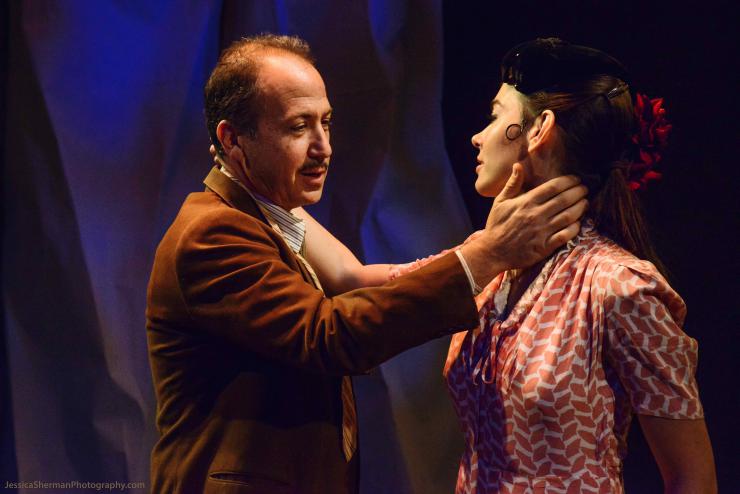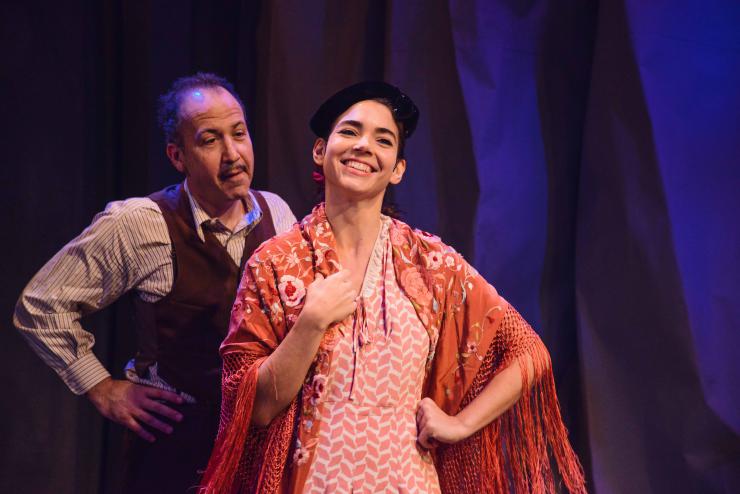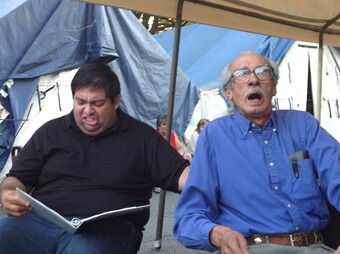Ay, Carmela! Divided Politics for the Ages
There must have been a plot brewing when the producers of Ay, Carmela! decided to stage Barcelona based author José Sanchis Sinisterra’s play about the Spanish Civil War—betting it would resonate with Latino and Anglo audiences in Los Angeles. The play was staged at the Hudson Theatre in Los Angeles from November 14-December 13, 2015. One has to wonder—what does a Spanish play like Ay, Carmela! have to do with Angelino reality?
Producer Claudia de Vasco (Mexican born), Eloísa Maturén, Alejandro Furth, and director Alberto Arvelo (all born and raised in Venezuela) got together and enlisted fellow countryman and Music & Artistic Director of the Los Angeles Philharmonic Gustavo Dudamel to do the music. The independent producers even talked Pulitzer Prize winning and Cuban-American Nilo Cruz (with Catalina Botello) to “adapt” the play, and world famous architect Frank Gehry to design the set—sounds like a winning combination, doesn’t it?

Ay, Carmela! takes place in the 1930s and features a small time vaudeville troupe made up of husband Paulina and his wife Carmela. They are Republican left leaning liberal democrats who support the second Spanish Republic. The troupe finds itself caught behind enemy lines of the Nationalist fascists led by General Francisco Franco who favored the monarchy and Catholic Church.
Most audiences aren’t familiar with the convoluted intricacies of the Spanish Civil War (1936-39). Although he never appears, Spanish poet Francisco Garcia Lorca has a moment in the play. Carmela claims he wrote her a poem. Note: The Fascists executed Lorca because he was not only an intellectual, but also a homosexual, which gives you an idea of how repressive the Nationalist regime was. Franco ruled Spain with an iron fist suppressing minorities like the Basques and the Catalans until his death in 1976. One legacy of the war is that many Catalans want to leave Spain to this very day.
Paulino (a brilliant Alejandro Furth) is a cautious man forced to suppress his leftist tendencies. Carmela, on the other hand, is a proud, militant, and defiant wife. Not only that, but she is beautiful and admirably acted by Eloísa Maturén. The play begins in an absurd manner—Carmela is already dead, appearing to Paulino as if in a dream as he drinks and sings a few bars of their signature song “Ay, Carmela!” Paulino is tortured by her death and that of the hundreds of Repulican International Brigade prisoners shot and buried in a mass grave by the fascists. Carmela magically appears from a kind of limbo where they serve “bad food.” (Well, she can’t taste anything.) The first act, totally devoid of any singing or dancing, goes by in a whirl of exposition.

The subject matter is hard to follow; seven years ago I went with a group of Mexican American educators to the Spanish university town of Alcalá de Henares, right outside Madrid. Founded by Cardinal Cisneros in 1499, a guide took us on a tour of the local cathedral where the Cardinal is buried. The guide commented in Spanish: “notice the burn marks on the tomb, which was a result of the Republican bombardment of the church that caused to the roof to cave in.” To which a matronly professor from Dallas remarked, “I don’t believe it, I have many fine Republican friends and they would never desecrate a church.”
So, when Americans think “Republican” they think of Donald Trump, not Lorca, Hemmingway, and George Orwell, who fought for the Spanish Republicans and wrote “Homage to Catalonia.” Not only did Orwell a take bullet in the jaw from a Nationalist sniper, but his experience of the cutthroat tactics of communists, socialists and anarchists as they fought for control gave him the fodder for Animal Farm and 1984. Orwell was one of the early liberals to critique the “unabashed subservience of the European leftists to the communist line.”
And as to what relevance the Spanish Civil War had for Latin America and by extension California one need only look at the Mexican Revolution (1910-17) where the same forces of liberalism and conservatism fought in what Mexican writer Octavio Paz called a “fiesta of bullets.” Those revolutionaries Emiliano Zapata and Pancho Villa defeated Dictator Porfirio Diaz only to see the revolution turn into a seventy-year dictatorship of the P.R.I. (Partido Revolucionario Institucional) is a double irony, with the P.R.I. welcoming many Spanish Republicans exiles to Mexico.
Just before Franco died in 1976 another similar battle raged in Chile between the socialist Salvador Allende and hard line caudillo, Augusto Pinochet. The struggle in Latin America continues to this day with the United States playing the role of oppressor of leftist governments in Guatemala, Cuba, Chile, Nicaragua, and more recently Venezuela. But it’s not just a Latin American conundrum, look at the polarization this election year between Donald Trump on the right and Bernie Sanders on the left.
But it’s not just a Latin American conundrum, look at the polarization this election year between Donald Trump on the right and Bernie Sanders on the left.
The play’s second act was much livelier, with passionate music and dancing by Carmela and the spectacular yet tragic variety show. The climax occurs as a fascist Italian officer forces Paulino and Carmela to stage a demeaning spectacle mocking the Republicans and their allies, the International Brigades. Paulino conducts an improvised show written by an Italian Colonel complete with a skit mocking the Republicans based on a real performer named “Le Petomane” who could “fart on cue.” In another skit Carmela is supposed to hold the Republican flag aloft bearing her “nakedness” to Dr. Tocametodo, (Dr. Touch Me Everywhere). Carmela, unable to demean herself, calls Paulino a “coward,” then waves the flag in solidarity with the International Brigade sealing her death and symbolizing the defeat of the Republican army.
Critics have condemned Gustavo Dudamel for his role as Music Director of the Simon Bolivar Symphony Orchestra of Venezuela and its tacit support of the “Revolutionary Bolivarian” government that has ruled the country since 1999. Current President Nicolas Maduro has alienated many with populist measures that include cheap gas and subsidies for the poor but raging inflation that’s turned the country into a failed state. Maduro recently lost an election and his reaction was Orwellian: “We got 43 percent of the votes . . . the counterrevolution triumphed yesterday, now“ he said using former President Hugo Chavez’s saying to mean that a loss is just short term. “They have come for the neoliberal restoration of the far right,” signaling that a defense of the Bolivarian Revolution is forthcoming.
Carmela is applauding, Paulino is cringing, and Angelinos remain on tiptoes, straining to see what’s coming around the bend.










Comments
The article is just the start of the conversation—we want to know what you think about this subject, too! HowlRound is a space for knowledge-sharing, and we welcome spirited, thoughtful, and on-topic dialogue. Find our full comments policy here